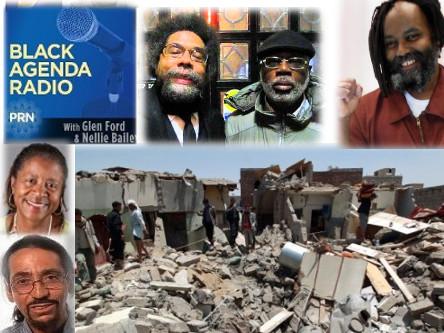End the “Army of Occupation” in Black America
The Black Is Back Coalition will hold a national conference on Black Community Control of Police, in St. Louis, Missouri, April 18 and 19. “Our recognition that Black lives matter means taking matters into our own hands,” said Coalition chairman Omali Yeshitela. “The Sharptons and government representatives want to convince Black people that an election will solve the problem, or body cameras will solve the problem,” instead of confronting “the essence of the system, which is anti-Black and anti-freedom. That’s why the fight for community control of police is so important.”
Mumia Targeted for “Execution by Medical Neglect”
Mumia Abu Jamal’s near-fatal diabetic emergency was either a case of medical neglect “or an attempt at execution through medical neglect,” said Prof. Johanna Fernandez, a member of the political prisoner’s legal team. His supporters are demanding that Abu Jamal be examined by doctors of his choice, and that all prisoners over age 55 be immediately released. “According to the Bureau of Prisons, 40 percent of prisoners have chronic illnesses that can lead to death,” said Fernandez. “Day after day, they are neglected in a systematic way by health contractors that put profit before the health of prisoners.”
Is Killer Cop a “Punk, Predator or Pig?”
Abu Jamal is back at the same Pennsylvania prison that failed to diagnose his illness. Despite his weakened condition, Mumia submitted a commentary to Prison Radio asking, rhetorically, how one should address Michael Slager, the South Carolina cop who shot Walter Scott in the back eight times. Should he be referred to as “Mr. Slager, or Officer Slager? Is he a punk, a predator, or what Huey P. Newton used to call, a pig?”
Plenty of Black Faces in High Places, But No Justice
“We’ve got a Black president, a Black attorney general, a Black cabinet secretary of Homeland Security, but we haven’t had one federal prosecution of a policeman for killing” a Black civilian, said activist and educator Dr. Cornel West, at a rally on Manhattan’s Upper West Side. Four years ago, West and Carl Dix co-founded the Stop Mass Incarceration Network, which has organized protests against police murders in cities around the country, April 14.
Somalis Can Defeat al-Shabaab
The western governments that finance the foreign occupation of Somalia should “train and raise the quality of Somali security forces so that they can do their own fighting against al-Shabaab,” said Dr. Abdi Ismail Samatar, chair of the Department of Geography, Environment and Society at the University of Minnesota, and a native of Somalia. “It doesn’t seem that there is the good will on the part of the U.S. government to help Somalis help themselves.” Al-Shabaab recently massacred nearly 150 students in neighboring Kenya, whose troops invaded Somalia three years ago. The Kenyans should “withdraw their forces to the border,” said Samatar.
U.S. Backs Saudi Bombing of Yemen
Saudi Arabia may be the nominal leader of the coalition of Muslim nations that has been bombing neighboring Yemen for the last three weeks, but the United States is the superpower at the heart of the operation, BAR editor and columnist Ajamu Baraka told Press TV. “The fact that the targeting, the logistics, and the equipment are all provided by the U.S. translates, for me, into a U.S. operation,” said Baraka, a founder of the U.S. Human Rights Network. He called the assault on Yemen “an ongoing international crime.”
Reparations Summit: “They Stole Us, They Sold Us, They Owe Us”
Advocates of reparations for slavery and the African slave trade gathered in New York City last weekend for an International Reparations Summit, organized by the Institute for the Black World. “The success of this gathering will be measured by what we do when we leave here to take the idea of reparations and tie it to the economic realities facing our people, so that the mass of our community takes it up as a demand which we can no longer ignore,” said Atty. Roger Wareham, whose December 12 Movement has been pressuring the United Nations on reparations-related issues since 1989.

